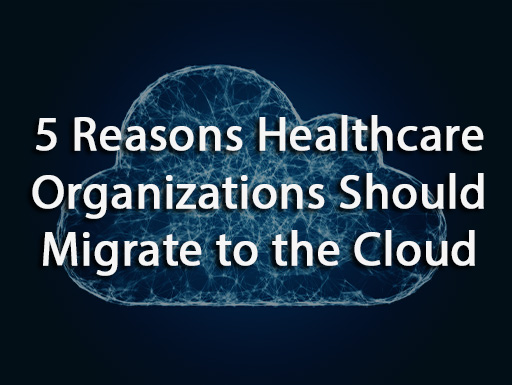5 Reasons Healthcare Organizations Should Migrate to the Cloud
January 3, 2023

Because of strict compliance regulations, healthcare organizations need to think carefully about migrating to the cloud. The migration process can be challenging. Healthcare providers need to avoid any chance of exposing patient data to unauthorized access and compromise. Healthcare organizations also can’t afford downtime during a migration because of the vital services they provide.
For healthcare organizations, such as hospitals, payors, and health tech companies, the benefits of cloud migration must outweigh the risks. Fortunately, moving to the cloud allows healthcare organizations to maintain compliance, reduce costs, and modernize their technology to meet the demands of many use cases.
Here’s an overview of 5 healthcare use cases that justify moving to the cloud.
1) Modernizing Clinical Systems
Electronic health records (EHRs) are vital to healthcare organizations because they are the source of all the patient information needed to make diagnostic and treatment decisions, including medical histories.
Moving to the cloud allows healthcare providers to provide a resilient and modern architecture for their EHR systems. The cloud delivers speedy recovery after a disaster, ensuring that medical records are always available. The cloud also provides an affordable platform for EHRs, helping to keep healthcare accessible for a wider range of populations.
Medical imaging and genomics are 2 more areas that benefit from cloud migration. The cloud scales easily to meet the storage, performance, and data analytics requirements of interpreting medical scans and genetic data.
2) Leveraging Advanced Analytics
With the cloud, healthcare organizations can support artificial intelligence (AI) and machine learning (ML) to gain deeper insights from patient information, including unstructured data, such as medical images and doctor’s notes.
AI can transcribe audio and interpret images, as well as use natural language processing (NLP) to understand documents. AI and ML help with reporting quality metrics, predicting disease, understanding population health trends, and optimizing healthcare operations for better outcomes.
3) Enhancing Patient and Clinician Experience
Patients have come to expect personalized and digital-first healthcare experiences. These raised expectations are testing the abilities of already overworked healthcare staffers.
The cloud provides a platform for a digital patient experience, taking the burden off healthcare workers. The cloud can be used to create the virtual care environments needed for telehealth, as well as to support intelligent contact centers.
Clinicians benefit from the ways the cloud streamlines workflows and supports automation, such as automated speech recognition. Automated workflows lessen the burden on clinicians, reducing burnout.
4) Supporting Medical Research Solutions
Hospitals and medical centers aren’t the only healthcare organizations that benefit from cloud migration. Medical researchers can take advantage of the data storage and computing power of the cloud.
The cloud may provide options for handling complex data at the higher rates of production and consumption demanded by medical researchers who are trying to understand and cure diseases, such as cancer and COVID.
5) Optimizing Finance and Operations
Migrating to the cloud also helps payors manage finances and healthcare organizations operate optimally. The cloud supports business systems, such as those for enterprise resource planning (ERP), for healthcare providers and payors.
By moving to the cloud, organizations can manage critical applications for accounting, finance, claims processing, and inventory. With the cloud, healthcare organizations gain fast and easy access to the computing power needed to manage their complete revenue cycle.
Staying Secure and Compliant in the Cloud
For healthcare organizations, maintaining HIPAA compliance is a high priority. Any cloud solution a healthcare provider migrates to must enforce regulations for controlling the access of patient information in electronic health records (EHRs).
Amazon Web Services (AWS) empowers your organization to deploy a cloud environment that supports HIPAA compliance through a HIPAA Reference Architecture. AWS also provides cloud solutions designed to support healthcare use cases.
As an AWS Partner, ProActive Solutions can help your healthcare organization take advantage of the security and compliance benefits of AWS. We take a consultative approach to cloud migration, assessing your readiness, uncovering use cases, and helping you plan for a seamless move to the cloud. Our experience working with organizations in the healthcare industry means we understand how to avoid downtime and protect patient data during the migration process.
Find out if moving to the cloud is the right decision for your healthcare organization. Ask for a cloud consultation from ProActive.
